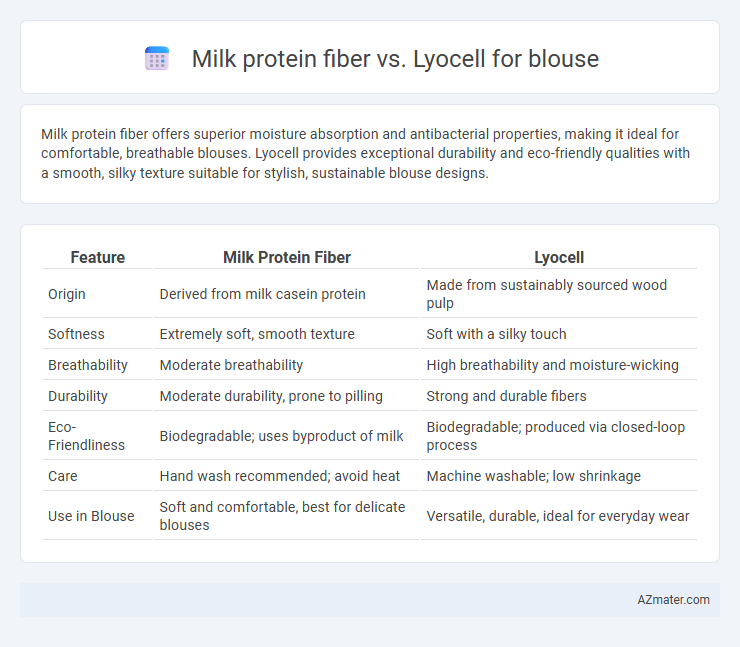Milk protein fiber offers superior moisture absorption and antibacterial properties, making it ideal for comfortable, breathable blouses. Lyocell provides exceptional durability and eco-friendly qualities with a smooth, silky texture suitable for stylish, sustainable blouse designs.
Table of Comparison
| Feature | Milk Protein Fiber | Lyocell |
|---|---|---|
| Origin | Derived from milk casein protein | Made from sustainably sourced wood pulp |
| Softness | Extremely soft, smooth texture | Soft with a silky touch |
| Breathability | Moderate breathability | High breathability and moisture-wicking |
| Durability | Moderate durability, prone to pilling | Strong and durable fibers |
| Eco-Friendliness | Biodegradable; uses byproduct of milk | Biodegradable; produced via closed-loop process |
| Care | Hand wash recommended; avoid heat | Machine washable; low shrinkage |
| Use in Blouse | Soft and comfortable, best for delicate blouses | Versatile, durable, ideal for everyday wear |
Introduction to Sustainable Blouse Materials
Milk protein fiber offers a biodegradable and eco-friendly alternative made from casein, providing softness and moisture-wicking properties ideal for sustainable blouses. Lyocell, derived from sustainably sourced wood pulp using a closed-loop process, ensures high breathability and durability while minimizing environmental impact. Both fibers contribute significantly to the shift towards sustainable fashion by reducing reliance on synthetic materials and promoting renewable resources.
What is Milk Protein Fiber?
Milk protein fiber, derived from casein protein in milk, offers a soft, breathable, and moisture-wicking fabric ideal for blouses, providing comfort and skin-friendly properties. Lyocell, made from sustainably sourced wood pulp, is known for its durability, smooth texture, and excellent moisture management, making it a popular eco-friendly alternative. Choosing milk protein fiber for blouses emphasizes natural protein-based softness and antibacterial benefits, while lyocell prioritizes sustainability and strength.
What is Lyocell?
Lyocell is a sustainable fiber made from wood pulp, known for its softness, breathability, and moisture-wicking properties, making it an excellent choice for blouses. Milk protein fiber, derived from casein in milk, offers a smooth texture and natural antibacterial benefits but lacks the same environmental benefits and durability as Lyocell. Lyocell's eco-friendly production process and strong yet lightweight nature make it highly favored in eco-conscious fashion, especially for comfortable, breathable blouses.
Eco-Friendliness: Milk Protein Fiber vs Lyocell
Milk protein fiber is derived from casein, a natural protein found in milk, making it biodegradable and renewable, with a lower environmental footprint compared to synthetic fibers. Lyocell, produced from sustainably sourced wood pulp through a closed-loop process, offers excellent eco-friendliness by minimizing chemical waste and water usage. Both fibers provide sustainable options for blouse fabric, but Lyocell's certified production process often results in superior environmental credentials.
Comfort and Softness: Comparing Fabric Feel
Milk protein fiber offers exceptional softness and moisture-wicking properties, making blouses feel smooth and comfortable against the skin throughout the day. Lyocell, derived from eucalyptus trees, is celebrated for its silky texture and breathability, providing a cool and gentle fabric feel ideal for sensitive skin. Both fabrics excel in comfort, with milk protein fiber delivering a plush, silky touch while lyocell enhances softness complemented by superior moisture management.
Breathability and Moisture Management
Milk protein fiber offers excellent breathability and moisture management by naturally wicking sweat away from the skin, ensuring comfort in warm conditions. Lyocell, derived from wood pulp, excels in moisture absorption and quick drying, providing a cool and soft feel against the skin. Both fibers enhance blouse performance, with milk protein fiber prioritizing hydration control and lyocell emphasizing airflow and moisture dispersion.
Durability and Care Requirements
Milk protein fiber offers moderate durability with a soft texture but requires gentle washing and careful handling to maintain its structure, while Lyocell boasts higher durability due to its strong cellulose fibers and is easier to care for, being machine washable and resistant to shrinking. Milk protein fiber is prone to damage from high temperatures or harsh detergents, whereas Lyocell maintains strength and shape through repeated washes, making it more suitable for everyday blouse wear. For long-lasting blouses needing low-maintenance care, Lyocell is generally the preferred choice.
Allergenicity and Skin Sensitivity
Milk protein fiber is naturally hypoallergenic and rich in amino acids, making it ideal for sensitive skin and reducing the risk of allergic reactions in blouses. Lyocell, derived from cellulose, offers breathability and moisture-wicking properties that minimize irritation and maintain skin comfort. Both fibers provide gentle alternatives, but milk protein fiber's bioactive peptides enhance skin nourishment, further lowering allergenicity compared to Lyocell.
Cost and Market Availability
Milk protein fiber tends to be more expensive than lyocell due to its specialized production process and limited large-scale manufacturing. Lyocell is widely available in the market and benefits from established supply chains, making it a more cost-effective option for blouse production. High demand and growing sustainability trends are gradually increasing milk protein fiber availability, but lyocell remains the dominant choice for affordability and mass-market accessibility.
Which is Better for Blouses: Milk Protein Fiber or Lyocell?
Milk protein fiber offers exceptional softness, moisture-wicking, and antibacterial properties, making it ideal for comfortable, breathable blouses that maintain freshness throughout the day. Lyocell is known for its smooth texture, excellent drape, and eco-friendly production, providing blouses that are durable, breathable, and gentle on the skin. Choosing between milk protein fiber and lyocell depends on whether you prioritize natural softness and antibacterial benefits or sustainability and fabric strength, with both materials excelling in making high-quality blouses.

Infographic: Milk protein fiber vs Lyocell for Blouse
 azmater.com
azmater.com